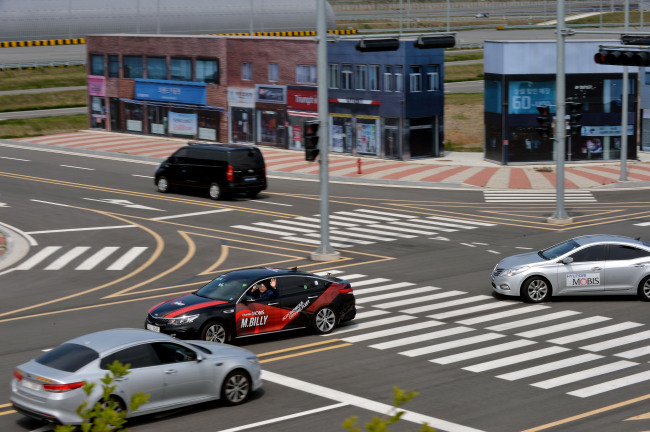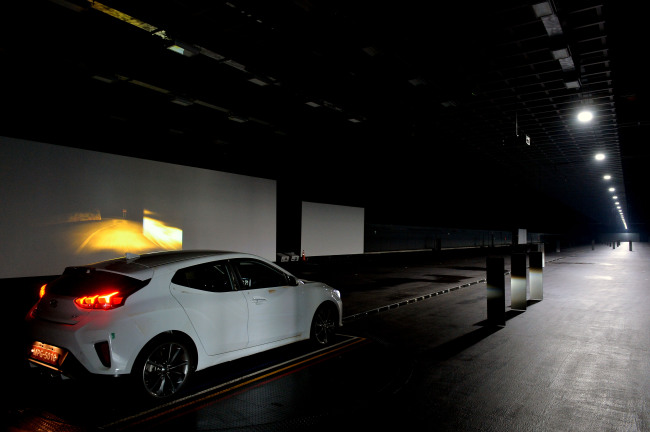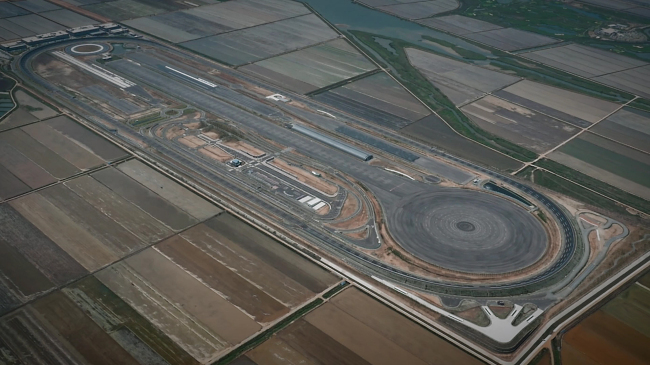Hyundai Mobis eyes self-driving car sensors by 2020
Mobis considers M&As, technical cooperation with global firms for LiDAR, camera sensors
By Kim Bo-gyungPublished : May 17, 2018 - 15:19
SEOSAN, South Chungcheong Province -- Hyundai Mobis, the auto parts making unit of Hyundai Motor Group, unveiled this week its test bed for autonomous vehicles and auto parts in Seosan, South Chungcheong Province, with a mission to develop self-driving car sensors by 2020.
Its long-term goal is to lead the future mobility market, and raise some 11 trillion won ($10 billion) in earnings through automated driving technology by 2025, according to the firm.
The unveiling came amid growing attention on the auto parts maker, with major advisory firms going against Hyundai’s plan to streamline its governance structure, pivoting on Mobis, which is set to be put to a vote at a general meeting on May 29.
Hyundai Mobis would be in charge of developing future mobility technologies if the vote goes through.
Its long-term goal is to lead the future mobility market, and raise some 11 trillion won ($10 billion) in earnings through automated driving technology by 2025, according to the firm.
The unveiling came amid growing attention on the auto parts maker, with major advisory firms going against Hyundai’s plan to streamline its governance structure, pivoting on Mobis, which is set to be put to a vote at a general meeting on May 29.
Hyundai Mobis would be in charge of developing future mobility technologies if the vote goes through.

“By utilizing the Seosan test bed, we will self-develop sensors for automated driving by 2020, and use the technology obtained to lead the global self-driving market (by 2025),” said Gregory Baratoff, vice president of Mobis’ DAS engineering group, during a presentation Wednesday.
To accomplish its goals, Hyundai Mobis is aiming to mass produce five radar sensors with two German companies from 2021.
Mobis is currently developing two entry-level radars with Germany’s Smart Microwave Sensors, and an ultrahigh frequency radar with a range of over 250 meters with another German company ASTYX.
It also plans to complete joint research underway with Seoul National University to distinguish objects on roads using digital signals.

About 300 billion won was invested in the testing site that spans 1.1 million square meters of land, the company said.
Opened in June last year, it is equipped with the world’s longest tunnel for testing vehicles at 250 meters.
“Hyundai Mobis’ technology using ultrasonic sensors and vehicle-to-everything is at a notable level. We now have LiDAR (light imaging detection and ranging) and camera sensors technologies to develop, which we anticipate to obtain in line with the explosive growth in the market,” said Hwang Jae-ho, director of Mobis’ DAS engineering group.
Mobis will strive for a “quantum leap” in its sensor technologies using deep learning and artificial intelligence, as the auto industry faces the task of developing sensors that accurately comprehend digital signals that contain information about the surrounding environment, Hwang added.
LiDAR refers to technology that measures the distance, angle and size of an object using pulsed laser, often described as the eye of automated vehicles. Radar sensors use radio waves to detect the distance and speed of vehicles in front or behind.
Mobis said it is considering mergers and acquisitions as well as technical cooperation with global companies known for camera and LiDAR sensors.
To mass produce level-three automated systems that contain self-developed sensors by 2022, Mobis is testing a unit of its self-driving car M.Billy at Seosan, alongside the US and Germany.

Out of the 25 sensors M.Billy runs on, one is self-developed by Hyundai Mobis.
It plans to increase the number of self-developed sensors installed starting from the third quarter of this year, Mobis said.
Market research firm Strategy Analytics projected automated driving sensors would increase to a $20.8 billion market in 2021 from $7.4 billion in 2016, posting some 23 percent annual growth.
Hyundai Mobis projected that its future mobility segment, which includes automated driving and connected car technologies, would see 11 trillion won in earnings in 2025 and stand for 25 percent of Mobis’ total earnings of 44 trillion won, a huge jump from this year’s expected figure of 5 trillion won.
Hwang also said the self-driving market would grow exponentially from next year.
To expedite development, Hyundai Mobis will gradually increase the portion of investments in research and development to 10 percent of its sales from auto parts by 2021, from the current 7 percent.
By Kim Bo-gyung (lisakim425@heraldcorp.com)












![[Today’s K-pop] BTS pop-up event to come to Seoul](http://res.heraldm.com/phpwas/restmb_idxmake.php?idx=644&simg=/content/image/2024/04/17/20240417050734_0.jpg&u=)




![[KH Explains] Hyundai's full hybrid edge to pay off amid slow transition to pure EVs](http://res.heraldm.com/phpwas/restmb_idxmake.php?idx=652&simg=/content/image/2024/04/18/20240418050645_0.jpg&u=20240419100350)

![[Today’s K-pop] Zico drops snippet of collaboration with Jennie](http://res.heraldm.com/phpwas/restmb_idxmake.php?idx=642&simg=/content/image/2024/04/18/20240418050702_0.jpg&u=)